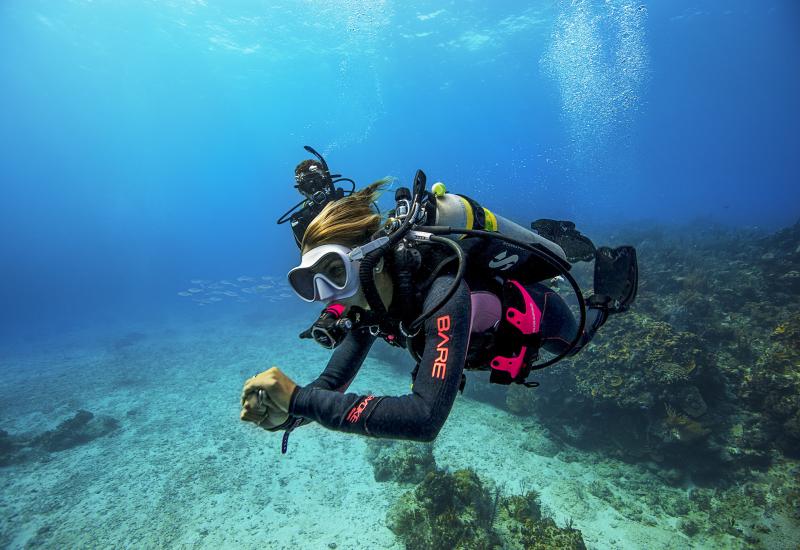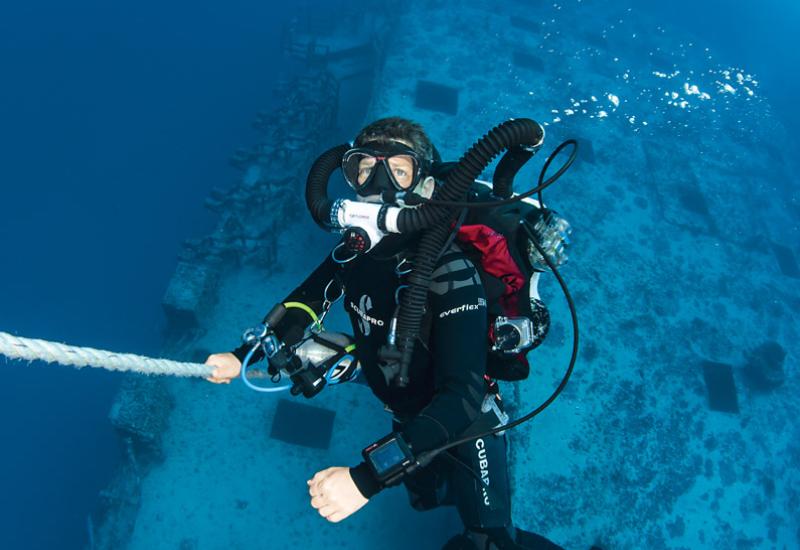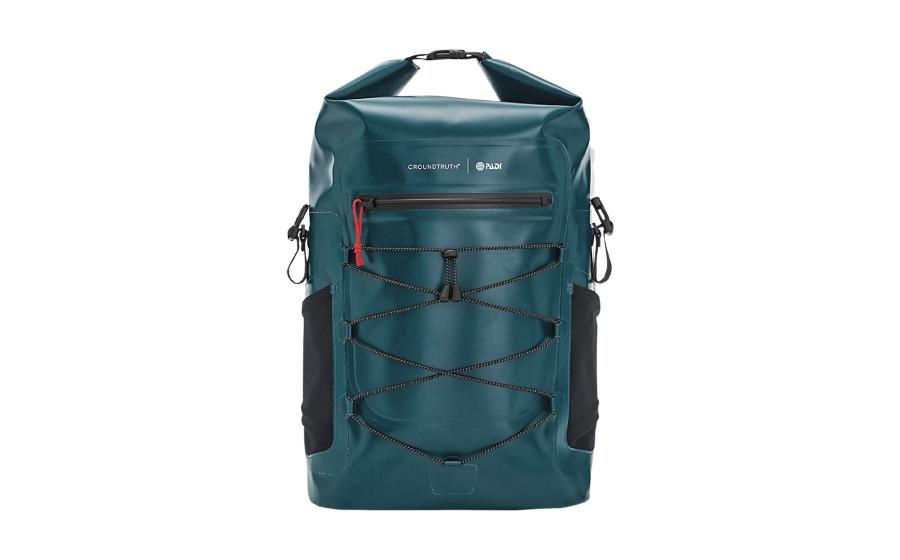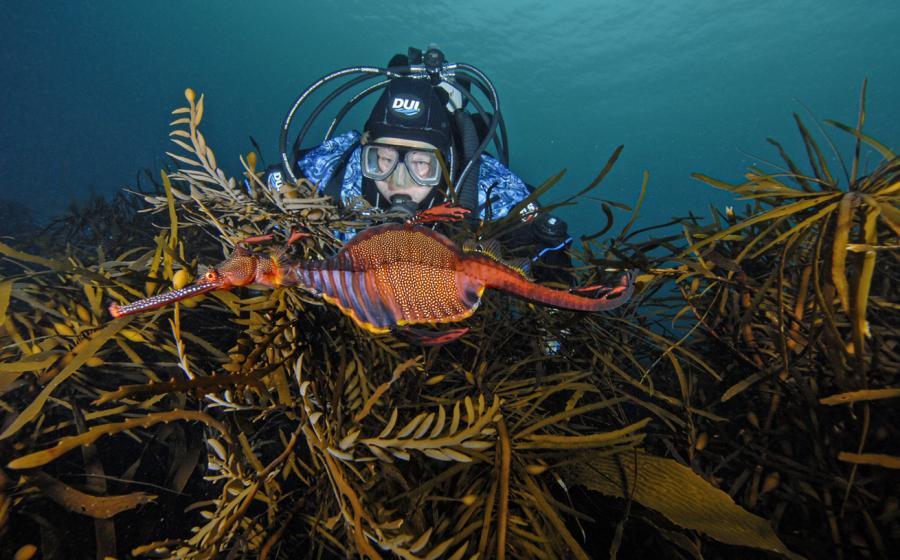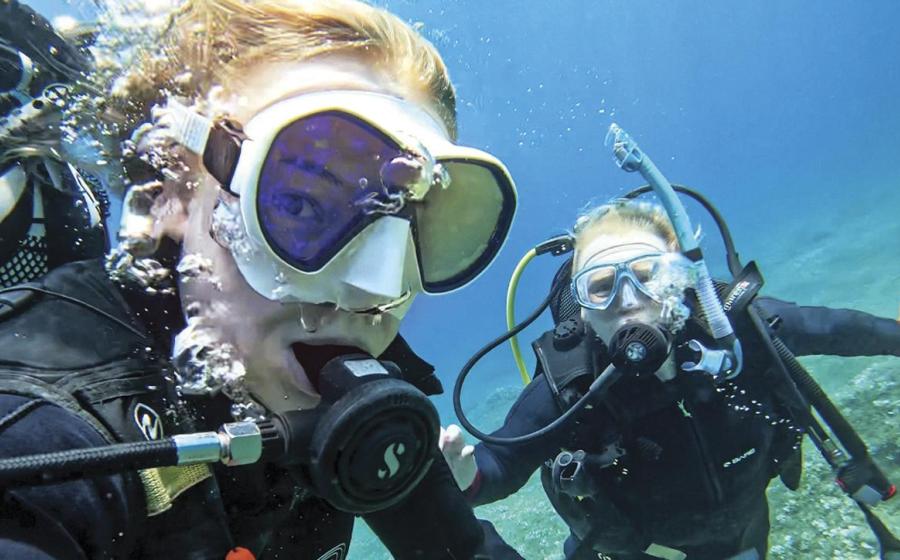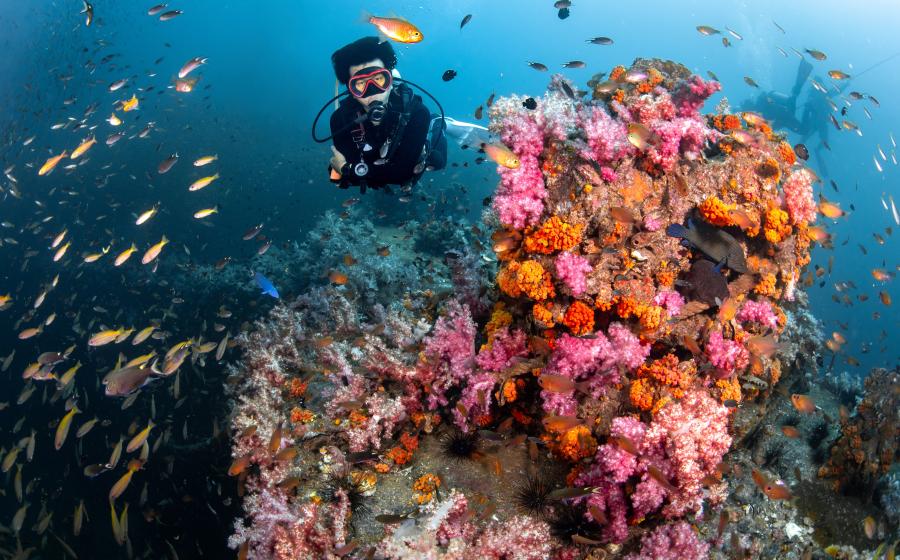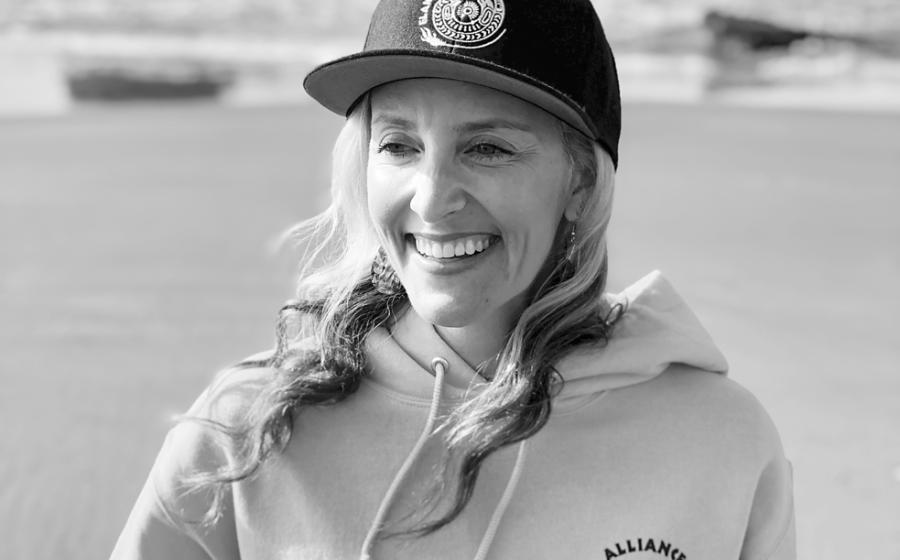Why Divers Panic
June 2001
By Arlene Perlmutter
Avoiding Panic Attacks Under Water
During a recent dive, I experienced a mild panic attack. I started breathing heavily, became a little disoriented and wanted to ascend quickly. However, I calmed myself down, and my breathing returned to normal. The same thing happened the next day. Do you have any suggestions for overcoming this intermittent fear?
via e-mail
Panic attacks are extremely dangerous under water, and it's often difficult to know what triggers them. Episodes of panic or near-panic may explain many recreational diving accidents and possibly some diving fatalities. Individuals who have a high level of underlying anxiety are at an increased level of risk. In a recent survey, more than half of divers reported experiencing at least one panic or near-panic episode. Panic attacks are often spurred by something that a nondiver or new diver would deem serious--entanglement, an equipment malfunction or being startled by a sea creature.
Sometimes, experienced divers with hundreds of logged dives experience panic for no apparent reason. The panic most likely occurs because divers lose sight of familiar objects, become disoriented and experience a form of sensory deprivation. Among inexperienced divers, there is usually an objective basis (e.g., loss of air, shark encounter, overhead environment) behind the panic response.
There are numerous methods to manage anxiety and panic:
-
Practice your diving skills until they become second nature.
-
Plan the dives and follow your plans.
-
Discuss your skills and concerns with instructors and divemasters.
-
Visualize possible problems and solutions before a dive.
-
Never dive beyond your training and capabilities.
Help, My DCS Won't Go Away!
I underwent chamber treatment for DCS in Australia and returned three weeks later for another session. A few months later, I still have symptoms, such as joint pain, exhaustion, shaking and pins and needles. I have sought out alternative forms of medical treatment and had an MRI and blood work. Nothing unusual was detected. What could be wrong?
via e-mail
This type of situation occurs occasionally and is generally caused by scarring and damage from the bubbles during your decompression incident. Adequate treatment in recompressing the bubbles will cause them to disappear but will not always get rid of the "footprints" of the bubbles, such as inflamed tissue. These footprints will not respond to further recompression because they are not bubbles, but are residual effects caused by the bubbles.
Your symptoms are not uncommon in people with neurological decompression accidents and usually do not require intervention. The usual course is one of very gradual improvement. Improvement can continue as long as one to two years after an accident. Don't dive again until your neurological symptoms have resolved.
Sick Diver's Checklist
by Arlene Perlmutter
Can you dive with a cold? Unless you answer "yes" to all these questions, you should stay on the beach.
-
Close each nostril in turn. Can you breathe easily through both sides of your nose?
-
Have you gone at least two hours without having to blow your nose?
-
Can you equalize your ears with minimal effort on land?
-
Has it been at least a day since you have had fever, chills or sweats?
-
Have you gone at least two hours without coughing?
-
If you are taking medicine, will it last until at least two hours after the dive ends?
Online Dive Poll: Hiding Medical Conditions
by Arlene Perlmutter
Should a dive operator have the right to disqualify you from diving because of a medical condition?
Yes: 83%
No: 17%
Medical conditions concealed from dive operators
Cold/flu: 27%
Asthma: 22%
Allergies/sinus problems: 8%
Hypertension: 6%
Ear infection: 5%
Back injury: 4%
Mental illness: 4%
Other: 24%
When we asked the question "Have you ever hidden a medical condition from a dive operator?" we thought we'd find a few divers who concealed the sniffles (or other maladies) so they wouldn't have to sacrifice bottom time. Yikes.
After sifting through more than 1,350 responses, we found 11 percent of divers have fudged the truth when asked abotu existing medical conditions by their dive operators.
The conditions most commonly concealed are cold/flu, asthma, allergies/sinus problems, hypertension and ear infection. Of those who reported hiding a medical condition, the majority of divers (39 percent) said they controlled the problem with medication and did not consider it an impediment to diving. More than a quarter (29 percent) said they were cleared by a doctor for diving. Others (20 percent) were afraid the dive operator would disqualify them from diving if they revealed the condition.
Over 80 percent of all respondents believe the dive operator has the right to disqualify a diver because of a medical condition. An overwhelming number of divers indicated that dive operators must protect the safety of all divers on their boats and say it is the responsibility of each diver to be truthful about health problems to avoid placing themselves and others at risk for injuries. "I feel it is not only the operator's right, but his duty to protect passengers and others from the dangers of diving with a known medical condition" was a common thread expressed by respondents. Divers are also sympathetic to the liability issues dive operators could face if an accident occurs. As one dive instructor noted, "I feel that if I am legally liable for injuries or death, I should have all the information I can, to provide the best level of customer service for all parties."
While some medical conditions do not interfere with your ability to dive, other problems may compromise your health. Talk to a dive doctor to obtain accurate medical advice.
Bone and Joint Quiz
by Arlene Perlmutter
Musculoskeletal disorders, such as joint diseases, arthritis and low back pain, affect one out of four Americans. Do you know how problems with your bones and joints impact your diving? Take this quiz to test your knowledge.
1) What are the benefits of diving for people with arthritis?
A. a sense of well-being and absence of pain at depth.
B. maintenance of joint motion and muscle strength.
C. greater mobility
D. all of the above
E. none of the above
2) There should be no additional diving limitations or restrictions placed on divers with a hip replacement or other metallic inserts or implants.
A. this is a true statement
B. this statement is only partially true
C. this statement is false
3) What are the reasons for disqualifying divers with fractures, surgery or inflammations?
A. the loss of mobility and dexterity with a cast
B. the possible alteration in the uptake of inert gas at the site of injury resulting in delayed healing
C. the possibility of wound infection from marine organisms
D. all of the above
E. none of the above
4) Which of these arthritis drugs could cause adverse effects in divers?
A. hydroxychloroquine (Plaquenil)
B. Advil
C. penicillamine (Depen)
D. all of the above
E. none of the above
5) Why do joint prostheses made of metal or silicon pose no problem to the diver?
A. they are not air-containing and are not affected by Boyle's law
B. they are reactive to increased partial pressures of nitrogen
C. they are oxidative and do not cause oxygen toxicity
D. all of the above
E. none of the above
Answers: 1. D; 2. A; 3. D; 4. E; 5. A
For more information on diving with musculoskeletal disorders, visit http://www.scuba-doc.com/bone.htm.
Ernest S. Campbell, M.D., FACS, lives in Orange Beach, Ala. He is a retired surgeon, avid diver and webmaster of "Diving Medicine Online" (www.scuba-doc.com).
Arlene Perlmutter, MPH, graduated from Armstrong Atlantic State University in Savannah, Ga., and is a contributing editor at RSD.
June 2001
By Arlene Perlmutter
Avoiding Panic Attacks Under Water
During a recent dive, I experienced a mild panic attack. I started breathing heavily, became a little disoriented and wanted to ascend quickly. However, I calmed myself down, and my breathing returned to normal. The same thing happened the next day. Do you have any suggestions for overcoming this intermittent fear?
via e-mail
Panic attacks are extremely dangerous under water, and it's often difficult to know what triggers them. Episodes of panic or near-panic may explain many recreational diving accidents and possibly some diving fatalities. Individuals who have a high level of underlying anxiety are at an increased level of risk. In a recent survey, more than half of divers reported experiencing at least one panic or near-panic episode. Panic attacks are often spurred by something that a nondiver or new diver would deem serious--entanglement, an equipment malfunction or being startled by a sea creature.
Sometimes, experienced divers with hundreds of logged dives experience panic for no apparent reason. The panic most likely occurs because divers lose sight of familiar objects, become disoriented and experience a form of sensory deprivation. Among inexperienced divers, there is usually an objective basis (e.g., loss of air, shark encounter, overhead environment) behind the panic response.
There are numerous methods to manage anxiety and panic:
Practice your diving skills until they become second nature.
Plan the dives and follow your plans.
Discuss your skills and concerns with instructors and divemasters.
Visualize possible problems and solutions before a dive.
Never dive beyond your training and capabilities.
Help, My DCS Won't Go Away!
I underwent chamber treatment for DCS in Australia and returned three weeks later for another session. A few months later, I still have symptoms, such as joint pain, exhaustion, shaking and pins and needles. I have sought out alternative forms of medical treatment and had an MRI and blood work. Nothing unusual was detected. What could be wrong?
via e-mail
This type of situation occurs occasionally and is generally caused by scarring and damage from the bubbles during your decompression incident. Adequate treatment in recompressing the bubbles will cause them to disappear but will not always get rid of the "footprints" of the bubbles, such as inflamed tissue. These footprints will not respond to further recompression because they are not bubbles, but are residual effects caused by the bubbles.
Your symptoms are not uncommon in people with neurological decompression accidents and usually do not require intervention. The usual course is one of very gradual improvement. Improvement can continue as long as one to two years after an accident. Don't dive again until your neurological symptoms have resolved.
Sick Diver's Checklist
by Arlene Perlmutter
Can you dive with a cold? Unless you answer "yes" to all these questions, you should stay on the beach.
Close each nostril in turn. Can you breathe easily through both sides of your nose?
Have you gone at least two hours without having to blow your nose?
Can you equalize your ears with minimal effort on land?
Has it been at least a day since you have had fever, chills or sweats?
Have you gone at least two hours without coughing?
If you are taking medicine, will it last until at least two hours after the dive ends?
Online Dive Poll: Hiding Medical Conditions
by Arlene Perlmutter
Should a dive operator have the right to disqualify you from diving because of a medical condition?
Yes: 83%
No: 17%
Medical conditions concealed from dive operators
Cold/flu: 27%
Asthma: 22%
Allergies/sinus problems: 8%
Hypertension: 6%
Ear infection: 5%
Back injury: 4%
Mental illness: 4%
Other: 24%
When we asked the question "Have you ever hidden a medical condition from a dive operator?" we thought we'd find a few divers who concealed the sniffles (or other maladies) so they wouldn't have to sacrifice bottom time. Yikes.
After sifting through more than 1,350 responses, we found 11 percent of divers have fudged the truth when asked abotu existing medical conditions by their dive operators.
The conditions most commonly concealed are cold/flu, asthma, allergies/sinus problems, hypertension and ear infection. Of those who reported hiding a medical condition, the majority of divers (39 percent) said they controlled the problem with medication and did not consider it an impediment to diving. More than a quarter (29 percent) said they were cleared by a doctor for diving. Others (20 percent) were afraid the dive operator would disqualify them from diving if they revealed the condition.
Over 80 percent of all respondents believe the dive operator has the right to disqualify a diver because of a medical condition. An overwhelming number of divers indicated that dive operators must protect the safety of all divers on their boats and say it is the responsibility of each diver to be truthful about health problems to avoid placing themselves and others at risk for injuries. "I feel it is not only the operator's right, but his duty to protect passengers and others from the dangers of diving with a known medical condition" was a common thread expressed by respondents. Divers are also sympathetic to the liability issues dive operators could face if an accident occurs. As one dive instructor noted, "I feel that if I am legally liable for injuries or death, I should have all the information I can, to provide the best level of customer service for all parties."
While some medical conditions do not interfere with your ability to dive, other problems may compromise your health. Talk to a dive doctor to obtain accurate medical advice.
Bone and Joint Quiz
by Arlene Perlmutter
Musculoskeletal disorders, such as joint diseases, arthritis and low back pain, affect one out of four Americans. Do you know how problems with your bones and joints impact your diving? Take this quiz to test your knowledge.
1) What are the benefits of diving for people with arthritis?
A. a sense of well-being and absence of pain at depth.
B. maintenance of joint motion and muscle strength.
C. greater mobility
D. all of the above
E. none of the above
2) There should be no additional diving limitations or restrictions placed on divers with a hip replacement or other metallic inserts or implants.
A. this is a true statement
B. this statement is only partially true
C. this statement is false
3) What are the reasons for disqualifying divers with fractures, surgery or inflammations?
A. the loss of mobility and dexterity with a cast
B. the possible alteration in the uptake of inert gas at the site of injury resulting in delayed healing
C. the possibility of wound infection from marine organisms
D. all of the above
E. none of the above
4) Which of these arthritis drugs could cause adverse effects in divers?
A. hydroxychloroquine (Plaquenil)
B. Advil
C. penicillamine (Depen)
D. all of the above
E. none of the above
5) Why do joint prostheses made of metal or silicon pose no problem to the diver?
A. they are not air-containing and are not affected by Boyle's law
B. they are reactive to increased partial pressures of nitrogen
C. they are oxidative and do not cause oxygen toxicity
D. all of the above
E. none of the above
Answers: 1. D; 2. A; 3. D; 4. E; 5. A
For more information on diving with musculoskeletal disorders, visit http://www.scuba-doc.com/bone.htm.
Ernest S. Campbell, M.D., FACS, lives in Orange Beach, Ala. He is a retired surgeon, avid diver and webmaster of "Diving Medicine Online" (www.scuba-doc.com).
Arlene Perlmutter, MPH, graduated from Armstrong Atlantic State University in Savannah, Ga., and is a contributing editor at RSD.

